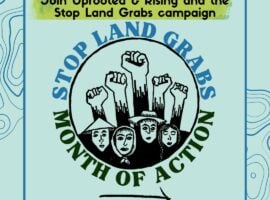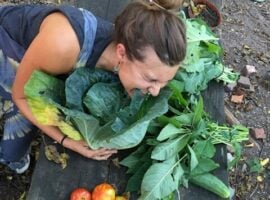Recently, Brooke Smith (Director of the Grassroots Action Network at WhyHunger), traveled with three of our partners—Don Bustos (NM), Alma Maquitico (TX) and Cesar Lopez (AZ) to learn and share with the Sonoran Desert Latino Food Justice Network. Conversations with leaders/activists/growers from Tucson down to the border town of Nogales, Mexico threaded through many layers of life and resistance in this thriving desert corridor. The group visited projects, shared meals, and engaged with visionaries on subjects as varied (and yet interconnected) as aquaponics, creating local markets for growers, using food as medicine, radical community organizing strategies, the effects of border militarization, and the profoundly hopeful opportunities for communities to build resilience by growing food. Check out some of the sites along the journey from Brooke’s perspective….
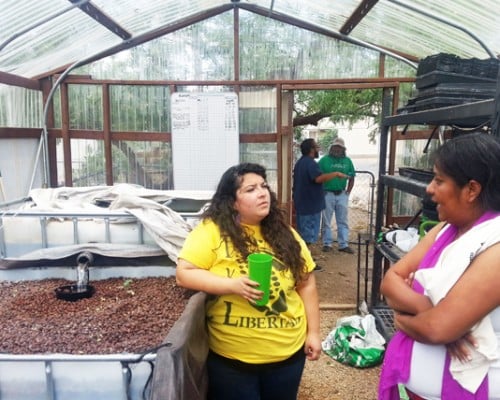 We started our journey on the south side of Tucson, learning about the agroecological approach that the Tierra y Libertad (TYLO) crew is taking to their food justice organizing in Barrio Wakefield. At their centro site, TYLO is continuing to cultivate food production, including this aquaponics system that will eventually be home to hundreds of tilapia, or “TYLOpia,” as Nelda affectionately refers to them!
We started our journey on the south side of Tucson, learning about the agroecological approach that the Tierra y Libertad (TYLO) crew is taking to their food justice organizing in Barrio Wakefield. At their centro site, TYLO is continuing to cultivate food production, including this aquaponics system that will eventually be home to hundreds of tilapia, or “TYLOpia,” as Nelda affectionately refers to them!
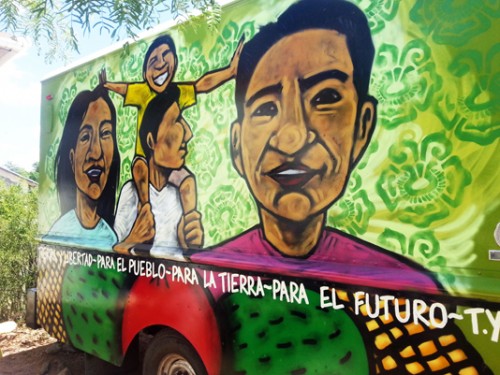 In addition to cultivation, TYLO is also thinking about distribution- HOW their community is able to access fresh, healthy food. They’ve just launched a mobile market–” La Troquita.” Putting a healthy twist on the traditional ice-cream truck concept, the colorful truck drives around the community, broadcasting catchy, home-grown jingles, and making it convenient (and, irresistible!) for the neighbors to buy fresh, local produce.
In addition to cultivation, TYLO is also thinking about distribution- HOW their community is able to access fresh, healthy food. They’ve just launched a mobile market–” La Troquita.” Putting a healthy twist on the traditional ice-cream truck concept, the colorful truck drives around the community, broadcasting catchy, home-grown jingles, and making it convenient (and, irresistible!) for the neighbors to buy fresh, local produce.
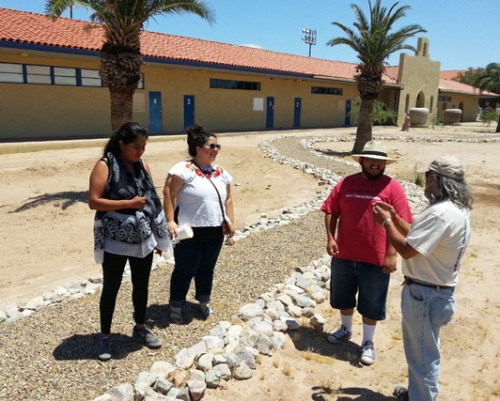 We also had the chance to visit a TYLO growing site at St. John’s Community Garden- a permaculture farm hosted in partnership on the grounds of a local grade school.
We also had the chance to visit a TYLO growing site at St. John’s Community Garden- a permaculture farm hosted in partnership on the grounds of a local grade school.
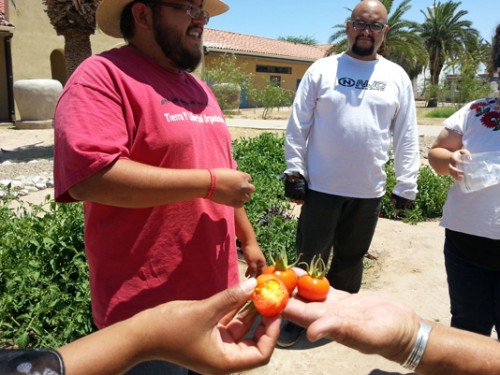 Training up with youth is an important part of TYLO’s organizing strategy. They know that the more youth can be part of the growing process, the more activated they will be to make healthy, culturally-rooted food choices for themselves and their families.
Training up with youth is an important part of TYLO’s organizing strategy. They know that the more youth can be part of the growing process, the more activated they will be to make healthy, culturally-rooted food choices for themselves and their families.
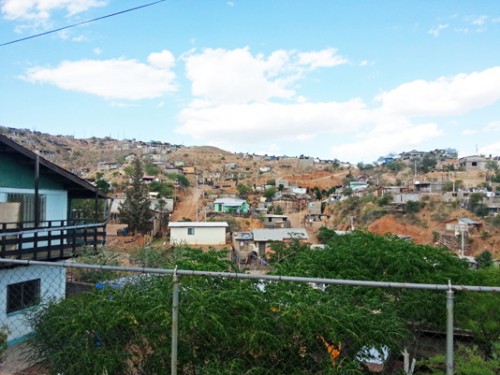 From Tucson we drove south through the high desert and across the US/Mexico border to the city of Nogales, Sonora, where we visited HEPAC (Hogar de Esperanza y Paz A.C.). The Mexican side of Nogales (it’s a city that is split between the two countries) is a community struggling against hyper-militarization, abusive poverty and the violent separation of a once fluid cultural and economic border that was home to families and businesses benefitting from bi-national trade. HEPAC is a community center (and so much more!) serving a neighborhood who’s main source of livelihood is salvaging metals in the regional garbage dump.
From Tucson we drove south through the high desert and across the US/Mexico border to the city of Nogales, Sonora, where we visited HEPAC (Hogar de Esperanza y Paz A.C.). The Mexican side of Nogales (it’s a city that is split between the two countries) is a community struggling against hyper-militarization, abusive poverty and the violent separation of a once fluid cultural and economic border that was home to families and businesses benefitting from bi-national trade. HEPAC is a community center (and so much more!) serving a neighborhood who’s main source of livelihood is salvaging metals in the regional garbage dump.
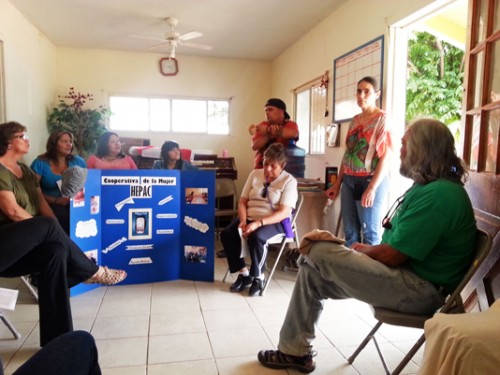 We shared stories and dreams with the women who volunteer at HEPAC. They do incredible work- serving daily healthy meals to over 100 kids, hosting a summer camp, teaching adult education courses, running income generation projects and a women’s cooperative, building a community garden, organizing with local border justice activists, and hosting bi-national immersion delegations including peace and conflict transformation workshops.
We shared stories and dreams with the women who volunteer at HEPAC. They do incredible work- serving daily healthy meals to over 100 kids, hosting a summer camp, teaching adult education courses, running income generation projects and a women’s cooperative, building a community garden, organizing with local border justice activists, and hosting bi-national immersion delegations including peace and conflict transformation workshops.
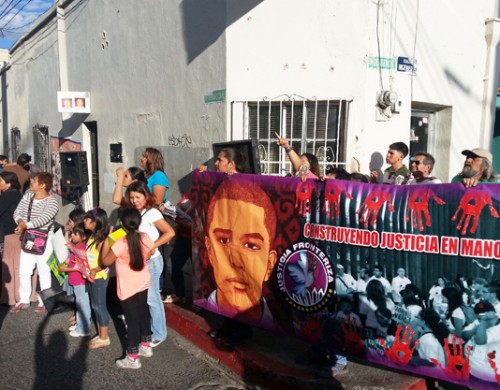 That evening we gathered with local US and Mexican activists for a peace rally at the spot on the Mexico side of the border fence where 16-year old Jose Antonia Elena Rodriguez was shot by US Border Patrol agents (who were on the US side) on October 10, 2012
That evening we gathered with local US and Mexican activists for a peace rally at the spot on the Mexico side of the border fence where 16-year old Jose Antonia Elena Rodriguez was shot by US Border Patrol agents (who were on the US side) on October 10, 2012
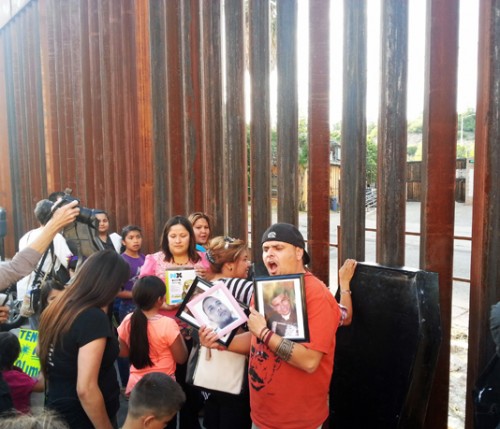 Protesters remembered and honored the names of many of the victims of excessive violence at the hands of border authorities, shouting out with a resounding “Presente!” as each name and photo was called. We stood at the fence with symbolic coffins, holding high a banner and photos of the victims’ faces, singing unity songs, hearing witness from victims’ families, and releasing doves into the evening sky.
Protesters remembered and honored the names of many of the victims of excessive violence at the hands of border authorities, shouting out with a resounding “Presente!” as each name and photo was called. We stood at the fence with symbolic coffins, holding high a banner and photos of the victims’ faces, singing unity songs, hearing witness from victims’ families, and releasing doves into the evening sky.
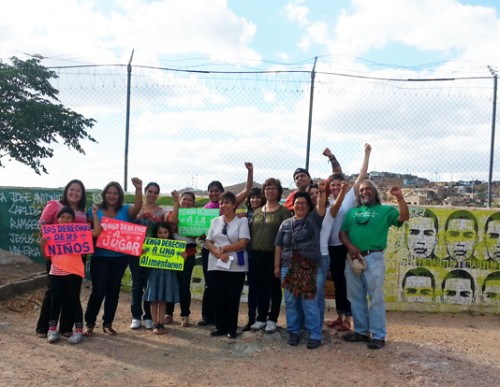 Looking through the fence bars, I felt both the crushing oppression behind the construction of that ridiculous hulking metal wall in front of us AND the powerful, unstoppable survival force of human beings acting together in fierce love for their community. I was overwhelmed with the honor of standing beside my friends and partners in the fight for the justice their community deserves, and in solidarity for the freedom and dignity of everyone on both sides of the border. Presente!
Looking through the fence bars, I felt both the crushing oppression behind the construction of that ridiculous hulking metal wall in front of us AND the powerful, unstoppable survival force of human beings acting together in fierce love for their community. I was overwhelmed with the honor of standing beside my friends and partners in the fight for the justice their community deserves, and in solidarity for the freedom and dignity of everyone on both sides of the border. Presente!



